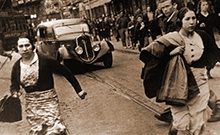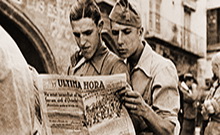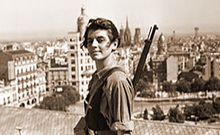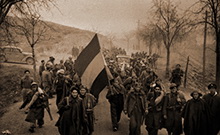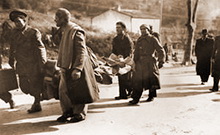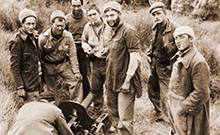Marina Ginestà
Marina Ginestà i Coloma (29 January 1919 – 6 January 2014) was a French-born Catalan veteran of the Spanish Civil War. She became famous due to the photo taken by Juan Guzmán on the rooftop of the original Hotel Colón in Plaça de Catalunya, Barcelona, during the July 1936 military uprising in Barcelona. As she was a reporter, it was the only time Ginestà was carrying a gun.
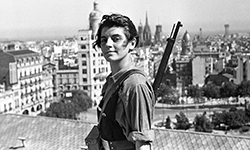 Marina was a member of Juventudes Socialistas Unificadas (Socialist Youth), the youth organization mainly directed by Partido Comunista de España (PCE, Communist Party of Spain). As the war broke out, she served as a reporter and a translator assisting Mikhail Koltsov, a correspondent of the Soviet newspaper Pravda.
Marina was a member of Juventudes Socialistas Unificadas (Socialist Youth), the youth organization mainly directed by Partido Comunista de España (PCE, Communist Party of Spain). As the war broke out, she served as a reporter and a translator assisting Mikhail Koltsov, a correspondent of the Soviet newspaper Pravda.
Despite her initial involvement she quickly grew disillusioned with the path that the Stalinists were taking. Marina remained a militant throughout the rest of the war and was drawn to other groups at that time such as the anti-Stalinist P.O.U.M (which the famous writer George Orwell was a member of) and the Anarchist C.N.T. Before the end of the war, Ginestà was wounded and evacuated to Montpellier.
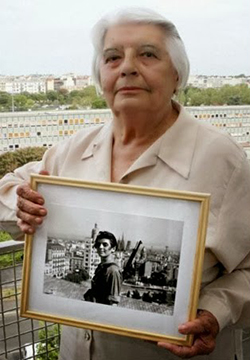 Marina did not knew about the photo until 2006, although the iconic image was printed and circulated everywhere, serving as cover for the book “Thirteen Red Roses” by Carlos Fonseca, and was also along with dozens of other photographs in the book “Unpublished images of the Civil War” (2002).
Marina did not knew about the photo until 2006, although the iconic image was printed and circulated everywhere, serving as cover for the book “Thirteen Red Roses” by Carlos Fonseca, and was also along with dozens of other photographs in the book “Unpublished images of the Civil War” (2002).
She was identified by Garcia Bilbao who read the memoirs of Soviet correspondent of Pravda Mikhail Koltsov, with whom the young girl appears in another photo. Garcia Bilbao found that Jinesta Marina, with J, which was identified by Guzman in the caption was actually Marina Ginestà, an exile who lived in Paris translating French texts.
Marina Ginestà, the iconic girl of the Spanish Civil War, moved to Paris in 1978 where she died January 6, 2014, aged 94. The Colón hotel was destroyed after the war and on its place today is the Banco Español de Crédito building.




